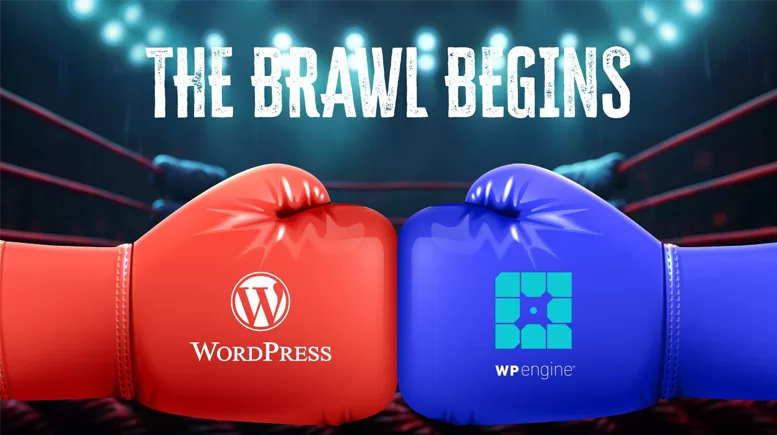
The relationship between WordPress and WP Engine, one of its largest hosting providers, has reached a boiling point in 2024. The public dispute, spearheaded by WordPress co-founder Matt Mullenweg, has escalated into a battle that not only impacts these two companies but also leaves thousands of WP Engine customers facing disruptions, vulnerabilities, and uncertain futures. Here’s a detailed look at what’s happening, why it matters, and what it means for WP Engine users.

Background: A Growing Rift
WP Engine has long been one of the top hosting platforms for WordPress-powered websites. It offers managed WordPress hosting solutions that provide users with premium features, including automatic updates, high-performance infrastructure, and specialized customer support. However, despite its focus on WordPress, WP Engine’s relationship with the broader WordPress community, specifically the platform’s leadership, has soured.
The trouble began when Matt Mullenweg publicly criticized WP Engine during the WordCamp US Summit in 2024. Mullenweg called WP Engine a “cancer to WordPress,” accusing the company of profiting from WordPress’s open-source code while failing to contribute meaningfully to its growth and infrastructure.
Mullenweg’s primary argument is that WP Engine builds its business by leveraging WordPress’s free software, without making significant contributions—whether financial or otherwise—to the open-source community that sustains it.
Escalation: Cease-and-Desist Letters and Legal Threats
WP Engine did not take Mullenweg’s comments lightly. The company issued a cease-and-desist letter, accusing Mullenweg of defamation and making it clear that it saw his statements as a deliberate attack on its business. WP Engine’s legal team argued that Mullenweg’s criticism was aimed at forcing the company to pay millions in licensing fees for the WordPress trademark, a move they saw as unwarranted and coercive.
According to WP Engine, Mullenweg’s stance was nothing short of a “scorched-earth” tactic, intended to harm the company unless it agreed to pay up. The hosting provider has accused Mullenweg of leveraging his position within the WordPress ecosystem to force WP Engine into unfair financial obligations, particularly around licensing the WordPress name.

WordPress.org’s Response: A Full Ban
In response to this legal standoff, WordPress.org took drastic action: it banned WP Engine from accessing its core resources. Specifically, WordPress.org has blocked WP Engine’s access to its plugin and theme directories, preventing WP Engine customers from automatically installing or updating plugins and themes via the WordPress admin panel.
Mullenweg defended this move in a blog post, stating that WP Engine’s business model, which involves reselling and customizing WordPress for its users, shouldn’t entitle them to free access to the platform’s resources. In his words, “Why should WordPress.org provide these services to WP Engine for free, given their attacks on us?” He went further to suggest that WP Engine wants to control the WordPress experience, without investing back into the community or contributing to the platform’s development.
How This Affects WP Engine Users
For the thousands of businesses and individual users who host their websites on WP Engine, this standoff has immediate and severe implications. The inability to automatically update or install plugins is not just an inconvenience—it’s a potential security disaster.
WordPress plugins, which extend the functionality of websites, are a critical part of the platform. However, they are also a common target for hackers. Outdated plugins are known to harbor vulnerabilities that can expose websites to malware, data breaches, and even total site takeovers. By blocking WP Engine’s access to the WordPress.org plugin repository, WordPress has made it significantly harder for WP Engine customers to keep their sites secure.
The ban also affects themes, which control the look and feel of WordPress websites. Many WP Engine customers rely on premium themes that require regular updates to stay compatible with new versions of WordPress. Without access to these updates, users could face site-breaking bugs and compatibility issues, leading to frustrating downtimes and functionality disruptions.
Why This Matters: Open-Source and Profitability
At the heart of this conflict is a larger philosophical debate: how do companies profit from open-source software, and what responsibilities do they have to the communities that create it?
WordPress, as an open-source platform, has thrived because of contributions from thousands of developers, designers, and companies worldwide. Mullenweg’s criticism of WP Engine centers on the belief that large, for-profit companies benefiting from WordPress’s success should contribute back to its development. This can take many forms, including financial contributions, code commits, or community support. In Mullenweg’s eyes, WP Engine profits significantly from WordPress without giving back proportionally, and he argues that this imbalance is harmful to the platform’s long-term sustainability.
On the other hand, WP Engine seems to believe that using open-source software doesn’t automatically obligate a company to pay up. They maintain that Mullenweg’s actions are more about pressuring them into making unnecessary payments rather than protecting the integrity of the WordPress ecosystem.

What WP Engine Customers Should Do
If you’re one of their customers, this situation may leave you wondering what steps to take next. Here are a few things you can do to minimize the impact on your website:
- Contact Support: WP Engine has advised its customers to reach out directly if they experience issues with plugin or theme updates. They may be able to offer workarounds or manual solutions until this dispute is resolved.
- Manual Updates for Plugins and Themes: Until access is restored, customers may need to manually update their plugins and themes by downloading the latest versions from developers’ websites or third-party marketplaces. While this process is more cumbersome, it can help keep your site secure in the short term.
- Consider Alternative Hosting Providers: Given the uncertainty surrounding this conflict, some users are considering switching to different hosting providers that still have access to WordPress.org’s full resources. If security and updates are a major concern, moving to a different host might provide peace of mind during this ongoing dispute.
- Need Help With These Options? Contact us today and we can help you out during these uncertain times.
Final Thoughts: Navigating the Conflict
The battle between WordPress and WP Engine is far from over, and it could have lasting effects on how companies interact with open-source platforms like WordPress. For now, the focus for WP Engine customers should be on maintaining the security and functionality of their websites while keeping an eye on how this conflict evolves.
At the end of the day, this conflict serves as a reminder of the delicate balance between open-source principles and commercial interests. While hosting companies have built successful businesses on top of WordPress, they may soon need to reevaluate how they support the platforms that power their services.
Stay informed, stay proactive, and watch closely as this drama continues to unfold.
Disclaimer: Creativity Design Group is not taking sides with either parties involved in this dispute. The information provided in this article is for educational purposes only and is not being written to attack either parties. Additionally, Creativity Design Group is an affiliate partner of WP Engine and we do receive commissions for sales made through this article or through word of mouth referrals. Thank you for your understanding.

